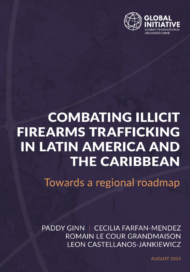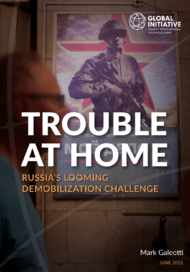Posted on 22 Aug 2025
In Mexico City, on February 25–26, and in Geneva, on August 25, 2025 – The Global Initiative Against Transnational Organized Crime (GI-TOC), in partnership with the Centro de Investigación y Docencia Económicas (CIDE), the Governments of Mexico and Switzerland, and with the support of the Swiss Embassy in Mexico, convened a series of high-level dialogues aimed at addressing the escalating challenge of illicit firearms trafficking in Latin America and the Caribbean.
These events, including a side-event at the Arms Trade Treaty (ATT) Conference in Geneva, brought together experts, policymakers, and civil society representatives to confront the urgent realities of gun violence in the region, which continues to record one of the highest per capita homicide rates globally. Notably, 80 percent of homicides in the region are caused by firearms.
Two priorities emerged clearly from these discussions. First, despite well-established cooperation channels, there remains a critical gap in knowledge about the political economy of arms trafficking networks—particularly how traffickers and their accomplices operate and adapt. Without this understanding, designing effective policy responses is impossible. Second, there is an urgent need to create a policy platform that bridges the Americas and the Caribbean. Although both regions face largely the same challenges when it comes to arms trafficking, they communicate and coordinate far too little to tackle the issue together.
Latin America continues to record one of the highest per capita homicide rates in the world, with 80 percent of deaths caused by firearms. In some countries, weapons legally imported are diverted to criminal markets, while in others they are trafficked across borders. This violence underscores the need for a unified, transnational strategy that goes beyond isolated responses and instead fosters cooperation across governments, law enforcement, civil society, and international partners.
A call for regional coordination
The discussions underscored the need for a coordinated regional response to firearms trafficking. Existing frameworks, such as the OAS Caribbean Firearms Roadmap, provide a model for joint action, while momentum is building in Central America to establish similar mechanisms. Effective engagement of larger states such as Brazil, Colombia, and Mexico will be critical to ensuring that regional strategies are comprehensive and sustainable.
Modernizing legislation and strengthening capacity
Participants highlighted the urgent need to modernize outdated firearms legislation and to adapt to the evolving methods of traffickers. Strengthening capacities at ports, maritime routes, and land crossings, improving forensic tools such as x-ray scanning and tracing technologies, and fostering information-sharing across borders emerged as key priorities.
Integrating civil society and public health approaches
The dialogues also elevated the role of civil society and emphasized the importance of viewing gun violence through a public health lens, as proposed by Jamaica. Framing the crisis as a public health issue broadens the scope of solutions, ensuring prevention and resilience-building are integrated alongside law enforcement measures.
A transnational program to address firearms trafficking
To build on these insights, GI-TOC advocates for the development of a new transnational program, with an initial focus on the U.S., Mexico, the Caribbean, Colombia and Brazil. The initiative shall be structured around three pillars:
- Research and Data – Generating field-based knowledge to inform evidence-based policy.
- Support for Civil Society – Strengthening local organizations through the Resilience Fund.
- Dialogue and Cooperation – Facilitating regional collaboration and exchange of best practices among governments, civil society, and law enforcement.
Private sector accountability and international responsibility
The meetings stressed that greater accountability is required from the private sector in the firearms trade. Governments must ensure that arms companies, including private security firms, uphold transparency and comply with strict regulatory standards. Furthermore, participants called on European and other exporting countries—including Turkey and Israel—to assume responsibility for the role their industries play in fueling violence across Latin America and the Caribbean.
A shared path forward
The dialogues made clear that firearms trafficking is not a challenge that any single country can address alone. A coordinated, transnational, and multi-stakeholder strategy is essential. Beyond reducing violence, tackling illicit firearms trafficking will help break cycles of crime, strengthen governance, and foster economic resilience in the world’s most violent region.
The Global Initiative Against Transnational Organized Crime remains committed to advancing this agenda, working in close cooperation with governments, civil society, and the private sector to dismantle the networks that perpetuate violence and instability.




